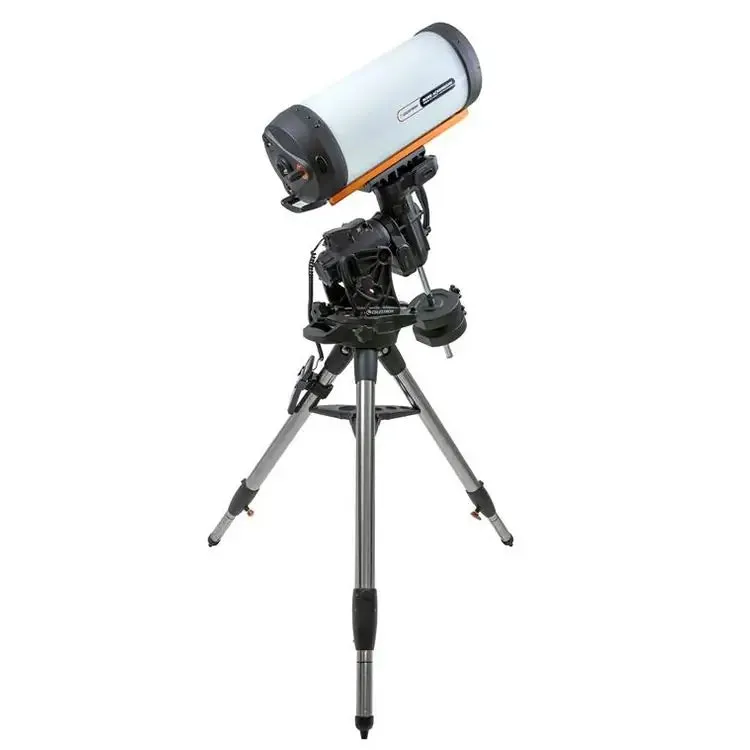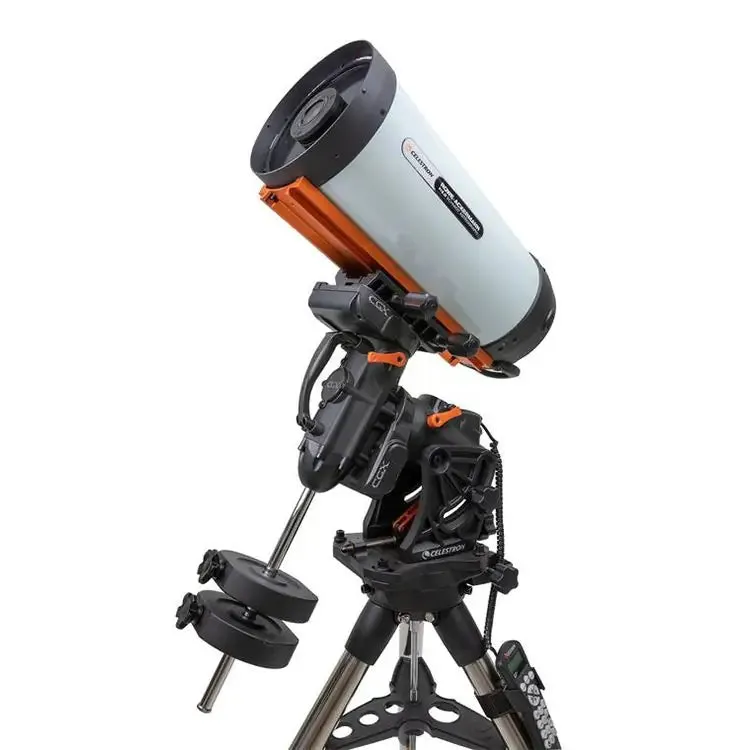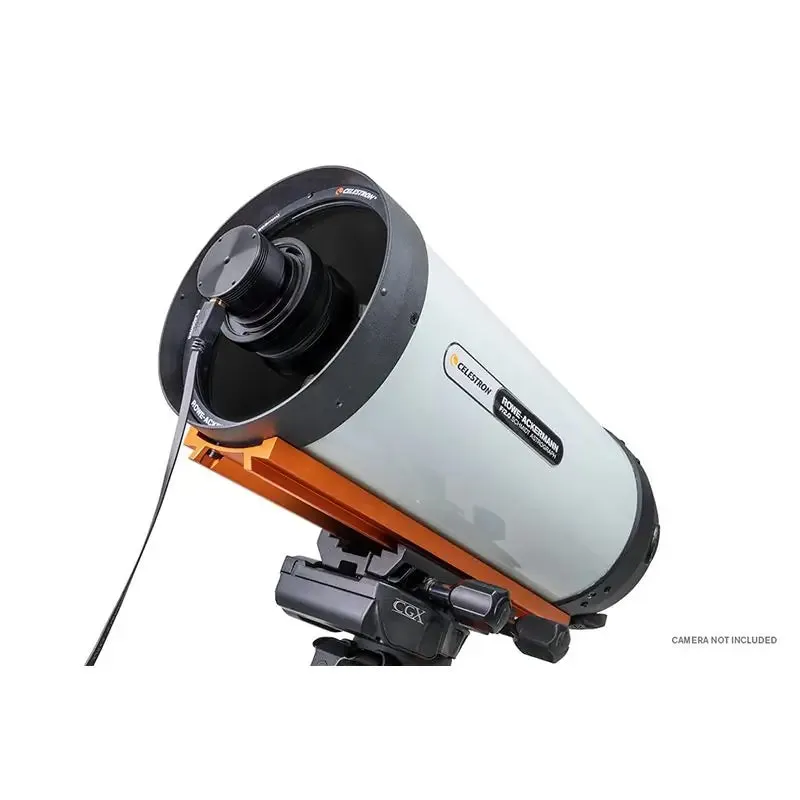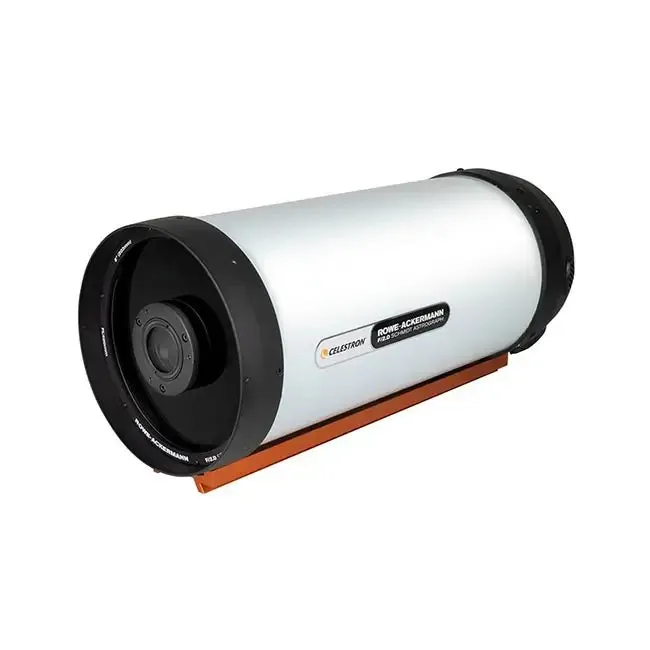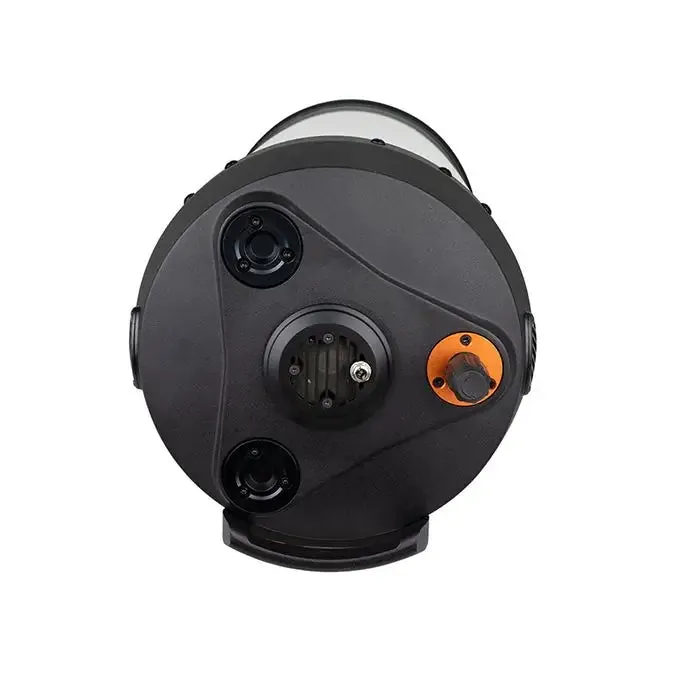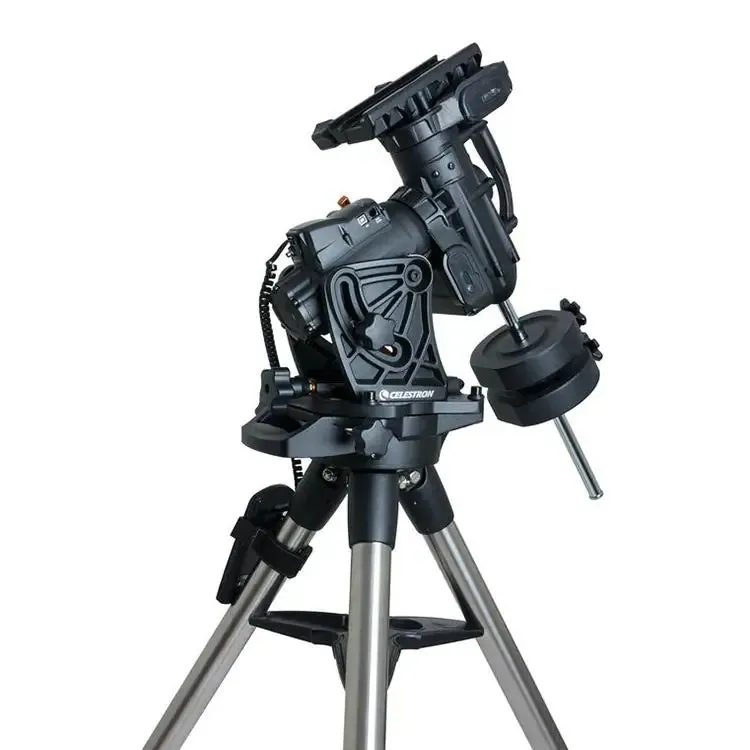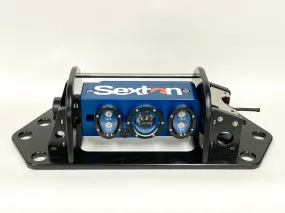Celestron CGX Mount With 8" RASA
This kit combines the 8” Rowe-Ackermann Schmidt Astrograph (RASA) with the state-of-the-art CGX German equatorial mount. Simply add a camera and this package offers everything you need to take spectacular images of wide-field deep sky objects. Although about the same size as the CGEM II, the CGX is a big step up in performance and features, especially for imaging applications.
RASA Performance Made for Everyone
Capture spectacular wide-field deep sky images in seconds with Celestron’s portable astrograph, the 8” Rowe-Ackermann Schmidt Astrograph (RASA). This incredibly fast f/2.0 system is the perfect companion to today’s color astronomical CMOS cameras, smaller CCD cameras, and mirrorless cameras. Thanks to its fast focal ratio and patented optical design, you can produce sharp, detailed images and, in many cases, skip the autoguider completely. Weighing in at just 17 pounds, it’s easy to transport your 8” RASA to the most remote dark sky locations.
The 8” RASA is an imaging telescope that delivers a flat-field without optical aberrations for razor sharp stars across a wide field-of-view. It can capture stunning deep-sky astronomical images without the challenges typically presented by longer focal length instruments at a fraction of the cost of those systems.
The latest addition to the RASA family, this 8” version is a much more portable and affordable version of the heralded RASA 11, which was introduced to much acclaim in 2014. With the 8” RASA joining the lineup, a wider range of astroimagers can enjoy the benefits of the RASA design. It has many of the same thoughtfully designed features as its “big brother” RASA 11, including the integrated air-cooling system, internal filter mount, and sturdy CGE dovetail mounting bar.
Purely designed for imaging, the 8” RASA cannot be used visually. The prime focus focal plane is located at the front of the optical system, so it cannot accommodate a traditional eyepiece.
Shorter Exposure Times and Virtual “Real-Time” Observing
Since it is an F/2.0 optical system, imagers can use shorter exposure times to capture detail in faint objects. When combined with sensitive cameras and the proper “live stacking” software, the 8” RASA can provide an almost real-time observing experience. View images on a computer instantly that are brighter and more detailed than can be seen in much bigger telescopes with the naked eye.
Ultra-Stable Focus System
With the launch of the 8” RASA, Celestron is unveiling a focuser design that mitigates lateral movement of the primary mirror when focusing, slewing, or tracking with the astrograph. Focusing is easier, more accurate, and more stable than ever. The key to the Ultra-Stable Focus System is a precision linear ball bearing, which is tested during assembly to ensure optimal results.
Built for Today’s Latest Cameras
Unlike the larger RASAs that work with DSLR and large CCD cameras, the 8” model was designed with color astronomical CMOS cameras, smaller CCD cameras, and mirrorless cameras in mind. The telescope does not work with standard DSLR cameras. It is optimized for sensors with up to a 22mm diagonal, but performs well with sensors up to 32mm diagonal. The APS-C sized sensors used in many mirrorless cameras are a good choice. 42mm full frame sensors will also work, but performance will be poor at the edges of the sensor and field illumination will be reduced. Additionally, we do not recommend pairing RASA 8 with any camera body more than 4” in diameter. See the chart below to determine if your camera is compatible with RASA 8.
| Camera | Compatible with RASA 8? | Adapter required |
|---|---|---|
| Astronomical CMOS/CCD camera with C-mount | Yes | C-mount adapter (included) |
| Astronomical CMOS/CCD camera with M42-thread mount | Yes | M42 adapter (included) with M42 extension tubes (not included) |
| Astronomical CMOS/CCD camera with other mount | Yes | Custom camera adapter |
| Canon mirrorless with APS-C sensor | Yes |
Canon mirrorless adapter (sold separately) |
| Sony mirrorless with APS-C sensor | Yes |
Sony mirrorless adapter (sold separately) |
| Canon mirrorless with full frame (42mm) sensor | Yes, but not optimized across the full sensor |
Canon mirrorless adapter (sold separately) |
| Sony mirrorless with full frame (42mm) sensor | Yes, but not optimized across the full sensor |
Sony mirrorless adapter (sold separately) |
| DSLR | No | -- |
Unique Optical Design
RASA’s optical design is patented (US 2016/0299331 A1). The design consists of a Schmidt corrector, primary mirror, lens group, and optical window. The lens group contains 4-elements and utilizes rare-earth elements. Unlike many telescopes that only perform well over the visible spectrum (400-700nm), the 8” RASA’s optics are designed to perform over a wider spectral range, from 400-800nm. This allows more of the light emitted from the astronomical object to be sharply focused in the image.
With many imaging systems, adding an extra piece of flat glass such as a filter does not change optical performance. However, that is not the case with super-fast optical systems like the RASA. Our engineers addressed this by designing the RASA with a removeable optical window, so you can maintain peak optical performance if a filter is added or if a camera has its own optical window. Celestron offers a Light Pollution Imaging Filter designed specifically for the 8” RASA, which mounts in place of the optical window.
All refractive optical surfaces are coated with StarBright XLT coatings, while the primary mirror uses enhanced aluminum coatings. This maintains high light transmission through the entire optical system.
When compared with “Hyperstar SCT” systems, the RASA 8 provides better optical performance and field illumination.
CGX: The Ideal Platform for RASA
The CGX is the culmination of Celestron engineers’ decades of experience in equatorial mount design, incorporating feedback from imagers worldwide. Combined with the RASA 8, it is a state-of-the-art deep-sky astronomical imaging system.
The CGX is an incredibly sturdy equatorial mount which rigidly supports the RASA 8. The mount was designed more compactly, so the instrument load is held closer to the R.A. axis, thus reducing torque from the load. It was also designed using FEA (Finite Element Analysis) software, which helped to optimize the stout structure of the mount. As a result, the CGX can support more weight than other mounts with similar mass. With its 55 lb load capacity, it can easily handle the RASA 8, which weighs only 17 lbs., along with a camera and any accessories. Expect a vibration-free setup, even in somewhat windy conditions. The RASA 8 connects directly to the CGX with its CGE dovetail mounting bar.
The heavy-duty adjustable height tripod has 2” diameter steel tripod legs with an extra-wide stance for improved stability. Graduated markings on the tripod legs make it easy to extend them to the same height and level the tripod.
The mount is packed with functionality and conveniences that make imaging with the 8” RASA easy. The fully computerized mount will automatically “GoTo” any of the 40,000 astronomical objects selected from the NexStar hand controller’s database and automatically track the object as it appears to move across the night sky.
Designed with imaging in mind, the CGX motor drive system builds upon learnings from previous generations of mounts. You can trust CGX to accurately track during an exposure. At the heart of the system are low cog DC servo motors with integrated optical encoders. The low cog design helps the motors run smoothly, while the integrated optical encoders provide accuracy. The motors connect to the worm gears with a belt-and-pulley system (instead of spur gears) to reduce gear backlash when the motor changes directions. The steel worm gears are supported by precision bearings and spring-loaded against a brass worm wheel, which also helps ensure a smoothly operating drive system with minimal backlash and no binding.
To track objects in the night sky, the mount must first be polar-aligned. Celestron makes this process easier than ever with the innovative All-Star Polar Alignment procedure. No extra equipment, such as a polar finder scope, is required. (An optional polar alignment finder scope is available if desired.) Best of all, the alignment can usually be completed in about 15 minutes, even without a clear view of Polaris.
All mounts have some amount of “periodic tracking error” inherent in them caused by tiny gear imperfections. To mitigate this, the CGX has Permanent Periodic Error Correction (PPEC). This allows you to run a routine to record the periodic errors only once; the recording is kept in memory, and subsequently corrects for the mount’s periodic tracking error. If an even higher level of tracking accuracy is desired, the CGX also has a dedicated autoguider port to connect an autoguiding camera directly to the mount to correct for any residual tracking errors.
Conditions for imaging are best when celestial objects are at their highest point in the sky with the darkest background, called the meridian. But some German equatorial mounts have trouble tracking near





